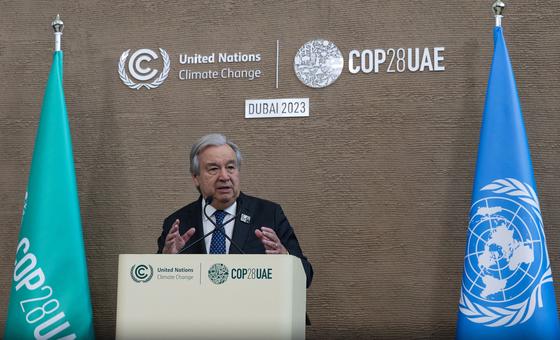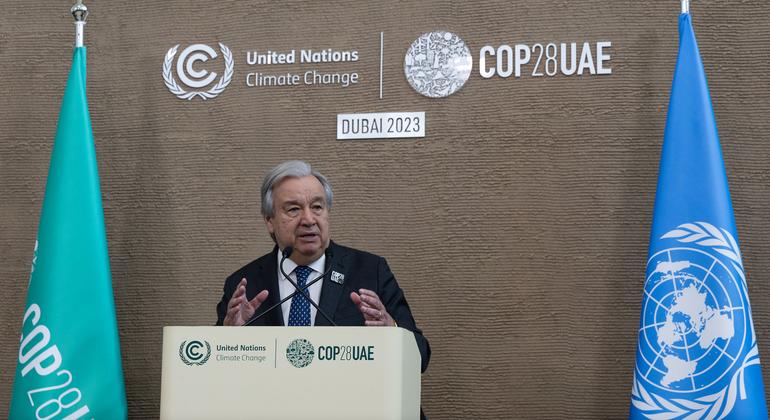
As COP28 entered its final 48 hours, the UN chief delivered a clear message to government negotiators: “We must conclude the conference with an ambitious outcome that demonstrates decisive action and a credible plan to keep 1.5-degree goal alive, protecting those on the frontlines of the climate crisis.”
‘The clock is ticking’
Negotiators are engaged in intense negotiations to hammer out a deal on key agenda items including the future of the use of fossil fuels, ramping up renewable energy, building resilience to climate change and ensuring financial support for vulnerable countries.
Speaking to reporters today, Mr. Guterres warned of humanity’s race against time as our planet is “minutes to midnight” for the 1.5 degree limit, referring to one of the keystone global warming targets set by the 2015 Paris Agreement. “And the clock keeps ticking.”
And yet, with COP28 so close to the finish line, there is still a “gap that needs to be bridged, said the Secretary-General.
Against this backdrop, he noted that “now is the time for maximum ambition and maximum flexibility. Ministers and negotiators must move beyond arbitrary red lines, entrenched positions and blocking tactics,” he said.
Urging countries to go into “overdrive to negotiate in good faith and rise to the challenge”, the Secretary-General also cautioned that any “compromise for solutions”, must not come at the cost of “compromising on the science or on the need for the highest ambition.”
He underscored that in a “fractured and divided world, COP28 can show that multilateralism remains our best hope to tackle global challenges.”
‘How high is our ambition’
Speaking to reporters just ahead of the Secretary-General, UN climate chief Simon Stiell said negotiations on an outcome document have a chance to begin a new chapter that delivers for people and planet.
He underscored the importance of finance as “the bedrock to scale-up climate action on all fronts”.Mr. Stiell said negotiations in Dubai have now boiled down to two issues:
- “How high is our ambition on mitigation”; and
- “Are we willing to back this transition with the proper means of support to deliver it?”
He stressed that the highest levels of ambition are possible on both, “but if we reduce on one, we reduce our ability to get either.”
To reach a meaningful deal, the many “unnecessary tactical blockades” seen along the COP28 journey must be removed, and “incrementalism” must be rejected, according to the climate chief.
He reminded negotiators that the world is watching and “there is nowhere to hide.”
“One thing is for certain: ‘I win – you lose’ is a recipe for collective failure. Ultimately it is 8 billion people’s security that is at stake”.
Global Stocktake
Following the landmark Paris COP, Dubai is the first time that a UN climate summit surveys progress towards achieving the goals agreed in 2015.
This so-named Global Stocktake is still being assessed and could pave the way to ambitious national climate action plans, or NDC’s that countries are due to submit in 2025.
Mr. Guterres has called for countries to step up their efforts to ensure maximum ambition on two fronts, namely ambition on reducing greenhouse gas emissions, and on delivering climate justice.
On Monday he stressed that the Global Stocktake must recognize the “need to phase out all fossil fuels on a time-frame consistent with the 1.5-degree limit – and to accelerate a just, equitable and orderly energy transition for all.”
Energy transformation
In his encounter with the press at Expo City, the Secretary-General focused on key action points essential to raise ambition and ramp up climate action on the energy transition front:
- A tripling of renewable power capacity, a doubling of energy efficiency and a phaseout of fossil fuel;
- Support, training and social protection for those who may be negatively impacted; and
- Consideration of needs of developing countries dependent on the production of fossil fuels.
He said that “timelines and targets might be different for countries at different levels of development”, but it should be in line with “achieving global net-zero by 2050 and preserving the 1.5-degree goal.”
Climate justice
Mr. Guterres recalled that COP28 began with two encouraging steps: an agreement to operationalize the Loss and Damage Fund to help vulnerable countries cope with the impacts of climate change, and the replenishment of the Green Climate Fund.
“It is a start, but much more is needed,” he said.
Given the challenges ahead of debt-ridden developing countries, the UN chief pushed for “all commitments made by developed countries on finance and adaptation to be met,” and in addition, “far more adaptation ambition will be needed.”
“COP28 must send clear signals that governments have grasped the scale of the adaptation challenge, and that it is a priority not just for developing countries, but the entire world,” he added.
New adaptation framework
Mr. Guterres welcomed the “emerging consensus for a new framework on adaptation” but cautioned that a “framework without the means of implementation is like a car without wheels.”
“The doubling of adaptation finance to $40 billion dollars by 2025 must be an initial step towards allocating at least half of all climate finance towards adaptation,” noted the Secretary-General.
Looking ahead, he flagged the next two years as vital for establishing a new global climate finance goal beyond 2025, and for governments to prepare new national climate action plans, fully aligned with the 1.5-degree limit.
“We can’t keep kicking the can down the road. We are out of road – and almost out of time,” he said, urging negotiators to rise to the scale and urgency of the climate challenge.



